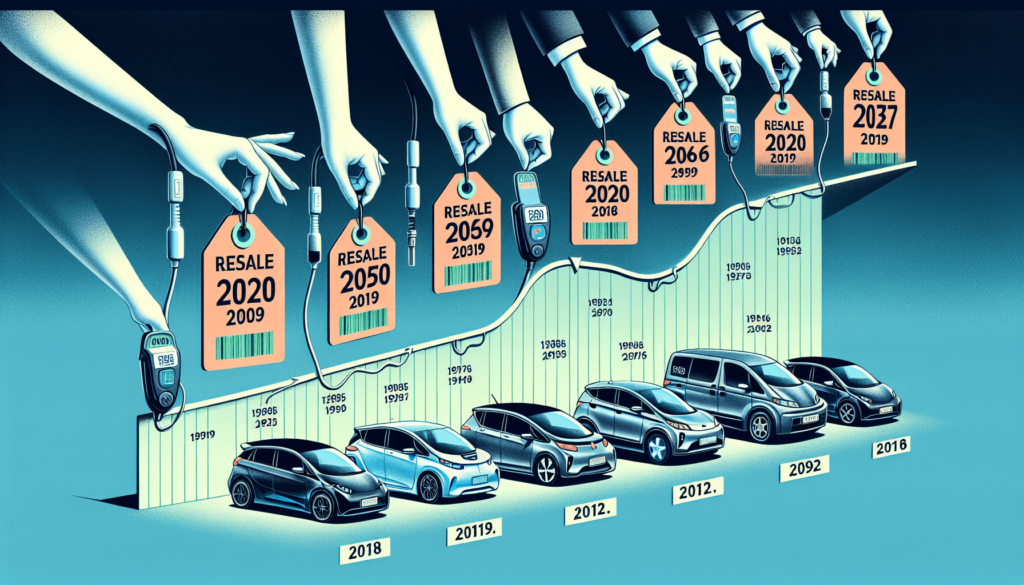In the rapidly evolving world of electric vehicles, the resale value is a topic of great interest to both current owners and prospective buyers. As technology advances and more people embrace electric transportation, the question of how the resale value of electric vehicles has been changing over time becomes increasingly relevant. In this article, we will explore the factors influencing the resale value of electric vehicles and delve into the latest trends and predictions for the future. Whether you’re a current owner looking to upgrade or simply curious about the investment potential of electric vehicles, this article will provide valuable insights into this dynamic market.

Introduction
Electric vehicles (EVs) have been gaining traction in recent years, with more and more people realizing their numerous benefits. As the demand for EVs continues to rise, it becomes increasingly important to consider the resale value of these vehicles. The resale value of an EV plays a crucial role in the overall perception and acceptance of these cars in the market. In this article, we will discuss the various factors that affect the resale value of electric vehicles and highlight the significance of resale value in the EV market.
Factors affecting resale value of electric vehicles
There are several factors that can impact the resale value of electric vehicles. One of the primary factors is the early adoption phase of EVs. During this phase, EVs tend to experience higher depreciation rates compared to traditional vehicles. This can be attributed to several factors, including the limited understanding and acceptance of electric vehicles by consumers. As a result, the resale value of EVs tends to be lower than that of traditional vehicles.
Technological advancements also play a significant role in shaping the resale value of electric vehicles. Improvements in battery technology, particularly in terms of capacity and longevity, have a positive impact on the resale value. As battery technology improves, the driving range of electric vehicles increases, making them more appealing to potential buyers. Additionally, enhanced charging infrastructure, such as the availability of fast-charging stations, can increase the convenience of owning an EV and subsequently influence its resale value positively.
Government incentives and policies also influence the resale value of electric vehicles. Many governments around the world offer subsidies and tax credits to encourage the adoption of EVs. These incentives make electric vehicles more affordable and attractive to consumers, leading to increased demand and potentially higher resale values. Additionally, some governments offer specific incentives for purchasing electric vehicles, such as reduced registration fees or access to restricted lanes. These incentives contribute to the overall value of an EV and can positively impact its resale value.
The growing demand for electric vehicles is another crucial factor affecting their resale value. As more people become aware of the environmental benefits of EVs, there has been a significant increase in their popularity. The rising demand for EVs leads to a higher resale value as the supply becomes relatively scarce. Furthermore, increasing awareness of the environmental benefits of EVs motivates potential buyers to opt for these vehicles, contributing to their resale value.
Manufacturer initiatives can also influence the resale value of electric vehicles. Many manufacturers offer extended warranties specifically for EV batteries, providing potential buyers with peace of mind when considering an EV purchase. Additionally, some manufacturers have buyback programs in place, allowing EV owners to sell their vehicles back to the manufacturer at a guaranteed price after a certain period. These initiatives enhance customer confidence in the longevity and reliability of EVs, positively impacting their resale value.
Resale Value Trends
Over time, the resale value of electric vehicles has shown promising trends. In the early stages of the EV market, resale values were relatively low due to factors such as limited consumer confidence and high depreciation rates. However, as the market matures and consumer knowledge about EVs increases, the resale value of electric vehicles stabilizes. In fact, some studies have shown that the resale value of EVs can be comparable to or even higher than that of traditional vehicles in certain cases.
Buyer perception also plays a crucial role in shaping the resale value of electric vehicles. Attitudes towards EVs have been evolving, with more and more people embracing the idea of electric mobility. Growing confidence in the durability and longevity of EV batteries has significantly influenced buyer perception, leading to increased demand and, consequently, higher resale values. As consumers gain more trust in the technology, the resale value of electric vehicles is likely to rise further.
Future Outlook
Looking ahead, the resale value of electric vehicles is expected to continue increasing. As advancements in battery technology continue, driving ranges will improve, making EVs even more desirable. Furthermore, the development of new technologies, such as solid-state batteries, could potentially revolutionize the EV market and have a significant impact on resale values. It is important to note that the resale value of electric vehicles is closely tied to the overall growth and acceptance of the EV market. As electric vehicles become more mainstream and widely adopted, their resale values are expected to reach new heights.
In conclusion, the resale value of electric vehicles is a vital consideration for potential buyers and a key indicator of the success and acceptance of these vehicles in the market. While early adoption phases and technological advancements can initially affect resale values, factors such as government incentives, growing demand, manufacturer initiatives, and changing buyer perceptions can help stabilize and elevate resale values over time. As the market for electric vehicles continues to grow and evolve, it is evident that the resale value of these vehicles will play a significant role in the future of transportation and sustainability.


